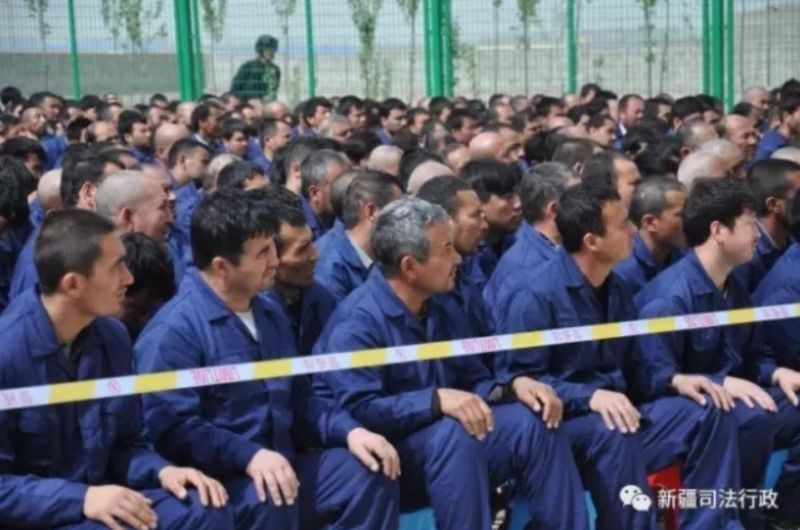Today is World Press Freedom Day. Every year, 3 May is a day to celebrate the principles of press freedom, but also to defend journalists from attacks and to remember those who have suffered because of their commitment to the free flow of ideas by word and image.
Today is also six months since internationally acclaimed photojournalist Lu Guang disappeared in Xinjiang, home region to China’s unfolding crimes against humanity. A U.S. permanent resident, Lu Guang had arrived in the regional capital of Urumqi in October 2018 to give a talk on photography before travelling to Kashgar, an ancient city at the epicentre of China’s assault on Uyghur culture. He was last heard from, says his wife, Xu Xiali, on the evening of 3 November.

Because press freedom is not only about what can and cannot be reported, but also the safety of journalists to be free from violence and arbitrary detention, this World Press Freedom Day, China must account for Lu Guang’s whereabouts and end its persecution of journalists across the country. His disappearance from Xinjiang highlights the cruelty inflicted upon Uyghurs and others as well as the lengths China will go to obscure its crimes.
Lu Guang, Speaking Truth to Power Through his Lens
Born in 1961, Lu Guang built his reputation as an independent photographer, eschewing the more typical route for many in his profession of working with state-owned media. As he grew professionally, as it would seem, so did his passion for social justice photojournalism.
In 2004, Lu Guang won first place in the prestigious World Press Photo contest for his work documenting the AIDS crisis in Henan province, in which thousands were dying. From the mid-1990s onward, poor residents of Henan had been coaxed into selling blood, but the lack of oversight and a government coverup led to large numbers becoming infected with the HIV virus with little to no accountability. His work exposed a dark truth that China’s leaders had hoped to obscure. Forced into the open it embarrassed leaders such as then Henan Governor Li Keqiang, today China’s premier.

Lu Guang has won numerous awards for his environmental photojournalism, including a lengthy collaboration with Greenpeace from covering Chinese logging in Cameroon and the Democratic Republic of the Congo to a hauntingly beautiful series on development and pollution in China, for which he also won a World Press Photo award in 2015.
While we still don’t know the exact—made up—charges the government will use against him, his independent-mindedness and talent for capturing emotional images of China’s dark side certainly make him a threat in the eyes of China’s authoritarian leaders, especially as they seek to obscure and control the narrative on Xinjiang.
In Xinjiang, Disappearances and Darkness
During a recent side event at the March Human Rights Council session in Geneva, Xinjiang scholar Adrian Zenz explained that we can now estimate that upward of 1.5 million mainly Uyghur and Kazakh, or 1 in 6 adults of the predominantly Muslim population, are or have been held in internment camps across the region. Meanwhile, the so-called “Becoming Family” campaign has sent upward of one million Party cadre into Uyghur homes sometimes a week at a time. While children whose parents have been detained are transferred into state custody, some accounts say they have been locked up like farm animals.

Confronting what has amounted to acts of cultural genocide, the vitality of Uyghur intellectuals, religious and community leaders has become paramount to survival, but China has increasingly treated even cultural expression as tantamount to acts of terrorism. As of March 2019, the U.S.-based Uyghur Human Rights Project has identified nearly 400 Uyghur intellectuals and cultural leaders detained since 2017.
The architect of China’s totalitarianism in Xinjiang is Chen Quanguo, who coincidentally worked under Li Keqiang in Henan during the AIDS crisis exposed by Lu Guang. With the extent of his police state, as one source put it, there’s little chance Chen Quanguo was unaware of Lu Guang’s presence. It would not be surprising if the order to take him had come directly from Chen Quanguo, as much to settle a vendetta as to obscure his crimes.
In April, a group of bipartisan congress members called for sanctioning Chen Quanguo under the United States’ Global Magnitsky Act, providing financial and visa sanctions for serious human rights violations. Similar calls have been made by human rights NGOs for some time. While international outrage has been weaker than we would hope, much of what we know today is the product of brave Uyghur journalists, some whose families have faced reprisal, and dedicated foreign correspondents, a reminder of the importance of a free press in exposing and, hopefully, ultimately holding perpetrators accountable.

This World Press Freedom Day, Demand Accountability
This World Press Freedom Day, China must account for Lu Guang’s whereabouts, allow him to be reunited with his family, and end its persecution of journalists across the country, from Gao Yu to Huang Qi.
As long as truly independent journalists are targeted and imprisoned in China, foreign governments who claim to support press freedoms and human rights should publicly treat Chinese media like Xinhua and CGTN as nothing but extensions of Party propaganda.
That Lu Guang disappeared in Xinjiang, rather than allowing the Party to obscure their crimes, this World Press Freedom Day we should demand answers to the severity of human rights violations in Xinjiang. This includes greater freedom of access for independent journalists but also ultimately an international independent fact-finding mission to the region.
Kong Tsung-gan‘s new collection of essays – narrative, journalistic, documentary, analytical, polemical, and philosophical – trace the fast-paced, often bewildering developments in Hong Kong since the 2014 Umbrella Movement. As Long As There Is Resistance, There Is Hope is available exclusively through HKFP with a min. HK$200 donation. Thanks to the kindness of the author, 100 per cent of your payment will go to HKFP’s critical 2019 #PressForFreedom Funding Drive.

